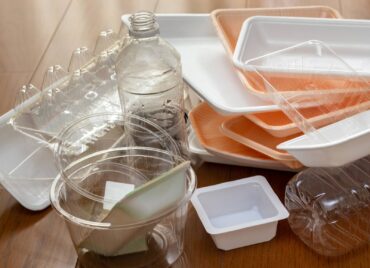 Dear EarthTalk: Are we really all exposed to many hazardous chemicals that come off the packaging our food travels in? What can we do to minimize our exposure to these potential toxins in our food? ~ William Freleigh, Newark, DE
Dear EarthTalk: Are we really all exposed to many hazardous chemicals that come off the packaging our food travels in? What can we do to minimize our exposure to these potential toxins in our food? ~ William Freleigh, Newark, DE
A large percentage of our food packaging contains toxic Food Contact Chemicals (FCCs), which are chemicals that come into contact with foods during manufacturing, packaging or transportation. Notable FCCs include BPA, BPS and BPF, all commonly found in soda and soup cans, plastic food linings and DVDs; and plasticizers or phthalates, which are widely used to make plastic products more flexible and durable.
At least 25% of FCCs, including BPAs and plasticizers, can be found in the human body due to exposure to food packaging, and can be extremely hazardous to our health. Some health risks include harm to the immune system, cancer, liver toxicity, thyroid effects and reproductive toxicity. BPAs are especially hazardous for women, as they are also toxic to the ovaries and uterus.
Due to the prevalence of FCCs in so much food packaging, it is impossible to fully avoid them. However, there are ways to reduce our exposure to toxic chemicals in our food. For one, buy food that is stored in glass jars or BPA-free boxes instead of metal cans and plastic containers, which are more likely to contain FCCs.
Also, wash your hands often and always before eating, steer clear of fast-food and fatty foods and eat fresh, unprocessed foods, especially organic fruits and vegetables. You can also reduce risks when preparing food by using wooden, stainless steel or silicone kitchenware and avoiding nonstick pans, disposable packaging, packaging with recycling codes 3 or 7 and black plastic kitchenware.
FCCs are also prevalent in cleaning products and other household items. You can reduce your exposure to chemicals in these products by using glass or stainless-steel reusable water bottles; buying fragrance-free soaps, cosmetics and cleaners; refusing paper receipts and avoiding vinyl carpets and fabrics. It is also recommended that you keep your windows open for ventilation whenever possible, as synthetic chemicals often deteriorate into dust particles that are easily inhaled.
Unfortunately, the only way that we will be able to permanently get rid of FCCs is to campaign for them to be banned by the government and by national retailers. Several volunteer-led campaigns have already spoken out on the issue, and a lot of headway has been made in banning specific toxic chemicals, including BPAs, in California. If you would like to help canvas for the banning of toxic chemicals in food packaging, consider volunteering for Take Out Toxics or other local campaigns that are pressuring their local governments and retailers to call for chemical bans.
This EarthTalk column is provided courtesy of E – The Environmental Magazine and published with permission.





















